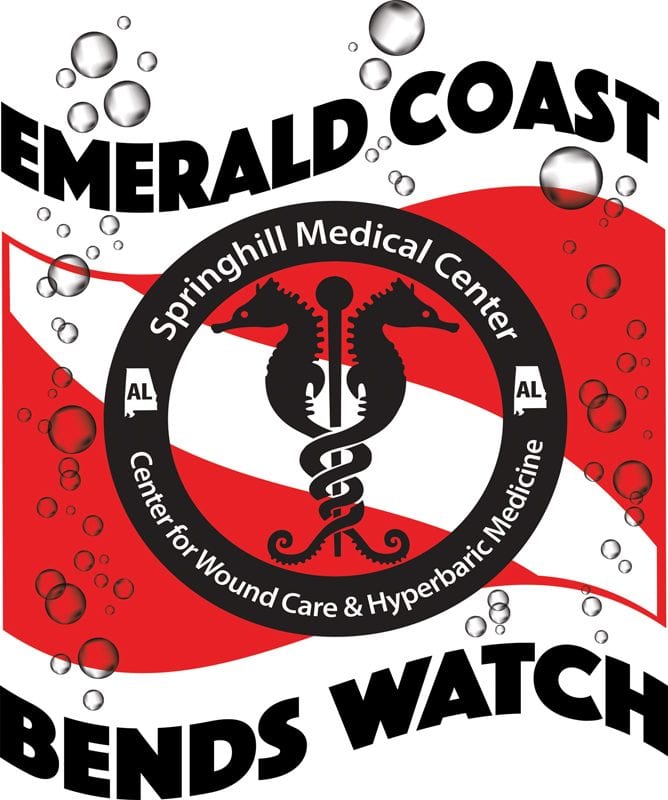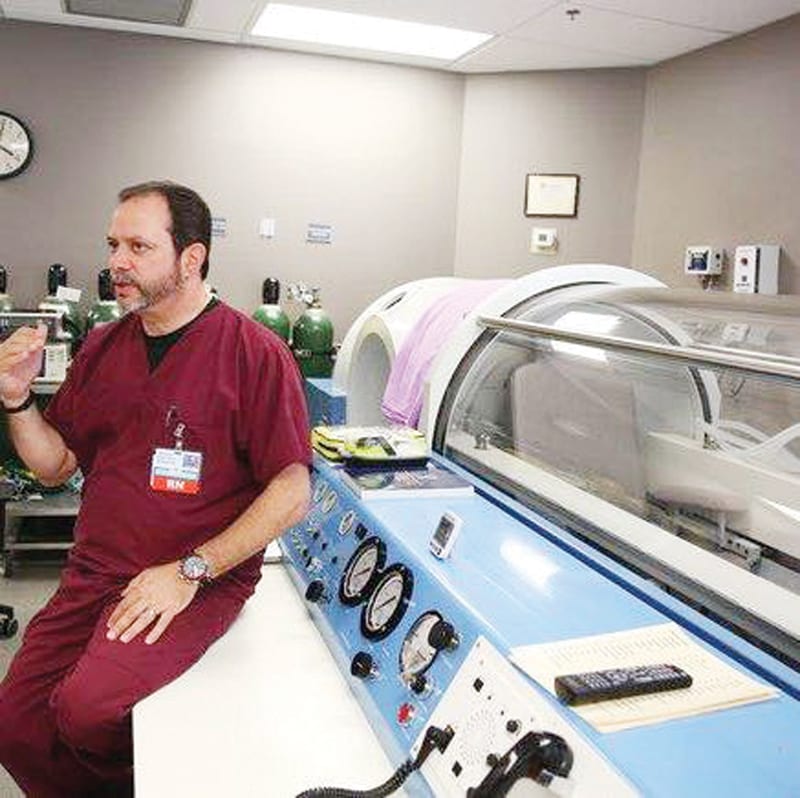By: Kerry Freeland / Dive Pros
The Escambia County Marine Advisory Committee meeting on May 13th includes a SCUBA divers safety symposium. With the big Lionfish tournament on the horizon, and many more in the wings, it is time to have an honest conversation about diver safety and personal responsibility. You cannot assume that if something bad happens, the “system” will have the knowledge and the ability to expeditiously provide proper treatment and care. A few years ago, I was close to a scuba diving fatality. The long and short of it is that had this individual been provided the proper treatment sooner, then he would have survived.
I started talking to other diving professionals in the Panhandle of Florida and was absolutely amazed to find that this sort of delayed treatment scenario happens far too often. When I say delayed you must understand my perspective.
There is only one first aid for barotraumic injury aside the airway, breathing, and circulation basics. The only first aid for a diving accident is oxygen. It is a must have. The patient must be provided as close to 100 percent oxygen as possible and without delay. The oxygen will find its way into damaged tissues and slow or completely prevent further injury. If there is a bubble of nitrogen in the body, whatever tissue is in contact with the nitrogen cannot get oxygen through normal circulatory process. You can however get this vital gas where it is needed through the back door. By hyperoxygenating the surrounding tissues, the damaged or starved tissue will be saved and start to heal. Oxygen cannot completely prevent all further damage. In many cases the nitrogen gasses the diver has absorbed are still coming out of his or her tissues. This off gassing must be controlled; therefore, the only treatment for these injuries is spending time in a hyperbaric chamber.
Hyperbaric chambers could be a whole separate topic. The chambers and their willingness to treat divers are nothing short of controversial. There are over eleven hundred hyperbaric chambers in the state of Florida but only four treat dive accidents. The thing to remember is that an injured diver needs to get to an operational one as soon as possible. The closest Florida chamber to the northern Gulf of Mexico is in Fort Myers. That is almost six hundred miles from Pensacola where I do most of my diving. Fortunately for us in the Pensacola area we have Springhill Memorial Hospital in Mobile Alabama. Julio Garcia and his fine staff will get you pressurized and on oxygen in no time, but first you must get to him. Unfortunately, getting to him could be a challenge. You see, a chamber treatment must be prescribed by a doctor. This doctor is going to look at other possibilities such as heart attack or other maladies, even if your dive buddy is in the emergency room shouting that you have suffered a diving accident. It is protocol, they must do a battery of tests before they can prescribe a chamber treatment.
If a diver gets these types of treatments, it will be expensive. Many times, standard HMO policies will not cover them. We are talking tens of thousands of dollars. I know one fellow whose helicopter evacuation to a recompression chamber alone was over fifty thousand dollars! Enter the Divers Alert Network, they provide supplemental insurance that will cover all aspects of diving accidents. For under two hundred dollars a year you become a member and get their insurance that will get you flown if necessary, to a recompression chamber. But that is not all they do. The Divers Alert Network provides other valuable services as well. If one has a diving accident, they should call the Divers Alert Network at once. Call (919)684-811 to access a twenty-four-hour emergency hotline to Divers Alert Network, DAN. DAN will have qualified medical personnel on the phone with you, your emergency medical technician, and your emergency room physician at no charge. Think about it, an ER doctor will be more willing to take advice from another physician than from your shouting friend. DAN is the repository for all the information on hyperbaric chambers that treat divers. They will direct you, or your attending ER physician, to the nearest operational recompression chamber and call them in advance to prepare for your arrival. They can orchestrate air evacuation and more. Call DAN, and join DAN, it really is a no-brainer.
You see it really isn’t as simple as calling 911. Well it can be, but aren’t you are taking your life into your own hands, when you trust it into someone else’s. Be proactive and take a few simple steps that will make the difference. Get DAN insurance, and keep their number handy. Call them to assist in a diving accident. Get trained and have oxygen on site. Every dive boat should have oxygen, not just the charter boats. Know what it takes to get the diver to an operational recompression chamber as fast as possible.
And if you see Julio somewhere besides his chamber; buy him a drink, or if possible, buy him a taco, he likes tacos.
For more information, contact Dive Pros at #850-456-8845

